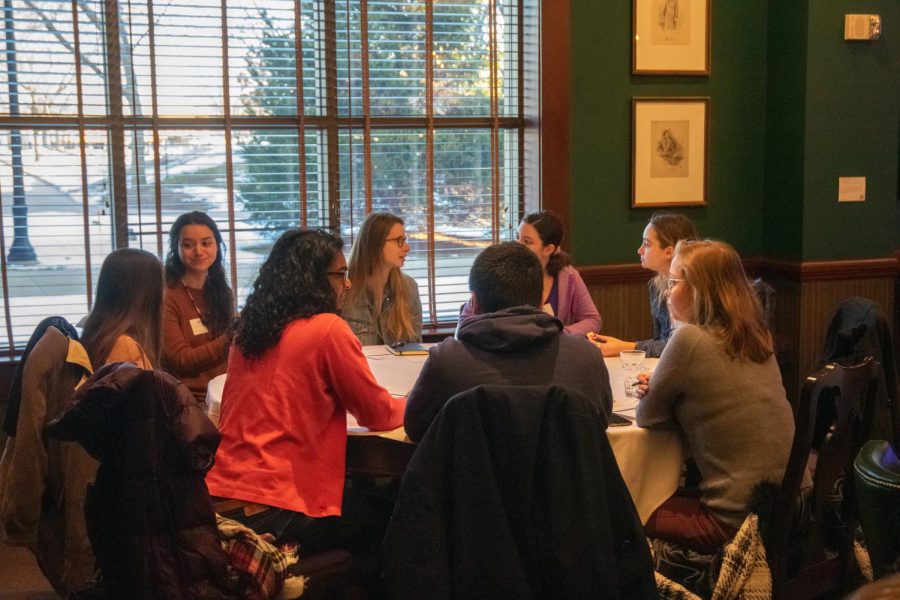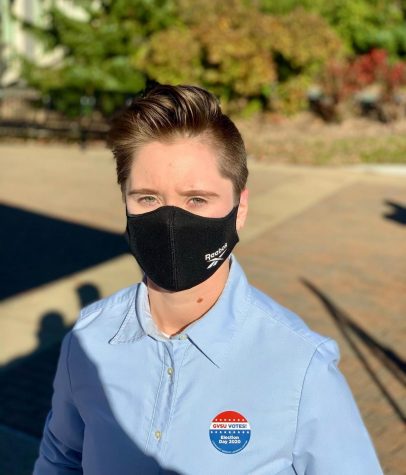GV Hosts 4th Annual MIMIL Interfaith Conference
Feb 24, 2020
The importance of learning about the diversity of religion and its impact on higher education, its students, and the world today is something that Grand Valley State University takes seriously. On Saturday, Feb. 22, GVSU’s Kaufman Interfaith Institute, in partnership with Campus Interfaith Resources, hosted the fourth annual Made in Michigan Interfaith Lab (MIMIL) at the Richard M. Devos Center on the Pew Campus.
The day-long conference was attended by students and staff from seven different universities, colleges and seminaries from around West Michigan. The conference included eight different informational sessions guided by knowledgeable guest speakers that covered interfaith topics ranging from an introduction to what interfaith work and dialogues are to frameworks and techniques for being highly engaged in interfaith spaces and how they can help build leadership skills.
Kevin McIntosh, coordinator for GVSU’s Campus Interfaith Resources and campus engagement manager for the Kaufman Institute, said that the main goal of the conference was to strengthen attendees understanding of interfaith work and help identify ways that a deeper understanding of the world’s religions and interfaith dialogues can help bring people together and benefit people both individually and collectively.
“With social justice and interfaith work on college campuses, sometimes it can feel like an island because you’re not really sure who else is doing it,” McIntosh said. “Having an event that brings people from different universities and backgrounds helps make those connections between people that love the work and want to educate others who don’t know what the term interfaith means and how it applies in the real world.”
The conference connected students and faculty from universities like Hope and Calvin College, where religion is an important part of student life and education. With sessions covering topics like intersectionality and interfaith traditions, students were able to share their experiences with interfaith work and discuss why community should not come at the expense of hindering or withholding different identities from one another. Other sessions covered concepts like skills and methods for engaging in challenging conversations and examine best practices concerning difficult issues of religious diversity on campuses and civic environments.
The conference introduced students from a range of majors, grades, backgrounds and colleges which made for a diverse learning experience. Isabella Lieberman, a sophomore accounting major at GVSU, said that she saw the conference as an opportunity to learn more about how interfaith work impacts the ways people interact and view one another and themselves.
“I was interested in the conference because I did a lot of this kind of work in high school and I was excited to learn that I could continue it in my college experience,” Lieberman said. “I think learning about interfaith dialogues helps foster a respect for all of the different religions and it can also help you learn a lot about yourself and your own beliefs and those are things that you will take with you after college.”
At GVSU, the Kaufman Interfaith Institute and Campus Interfaith Resources help students begin their interfaith journey through hosting events like the MIMIL conference, interfaith guest speaker events, site visits to local interfaith seminaries, and campus interfaith conversation nights. The Institute and Resource Center also work with many of GVSU’s faith-based student organizations to support and appreciate the richness of interfaith diversity at the university.
McIntosh said he encourages all students, no matter what major they may be or what their religious background is to work on staying educated on interfaith topics, as religion impact almost every post-college career, and being knowledgeable about diverse religions is an important part of being able to correctly and respectfully interact with people of all different backgrounds when you join the workforce after graduation.
“College is the perfect place to begin important social dialogues like interfaith work because of the diversity you see on every campus,” McIntosh said. “You have people of different ages, races, religions, sexualities and genders all in the same space, and gaining skills and insight into what makes us all unique is important in how we choose to interact. Religion impacts all types of careers, and being aware of different traditions and developing respect for all of them individually helps people to interact and do their jobs in a more positive, open, and less partisan way.”
























